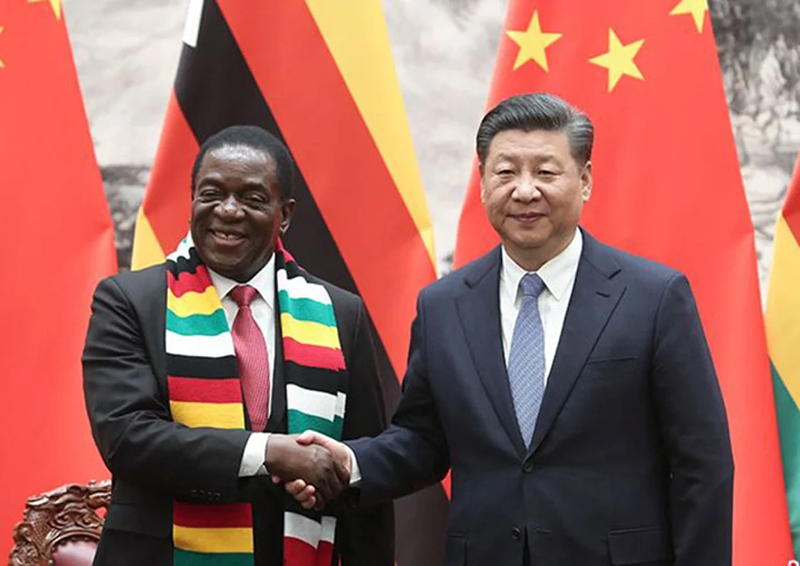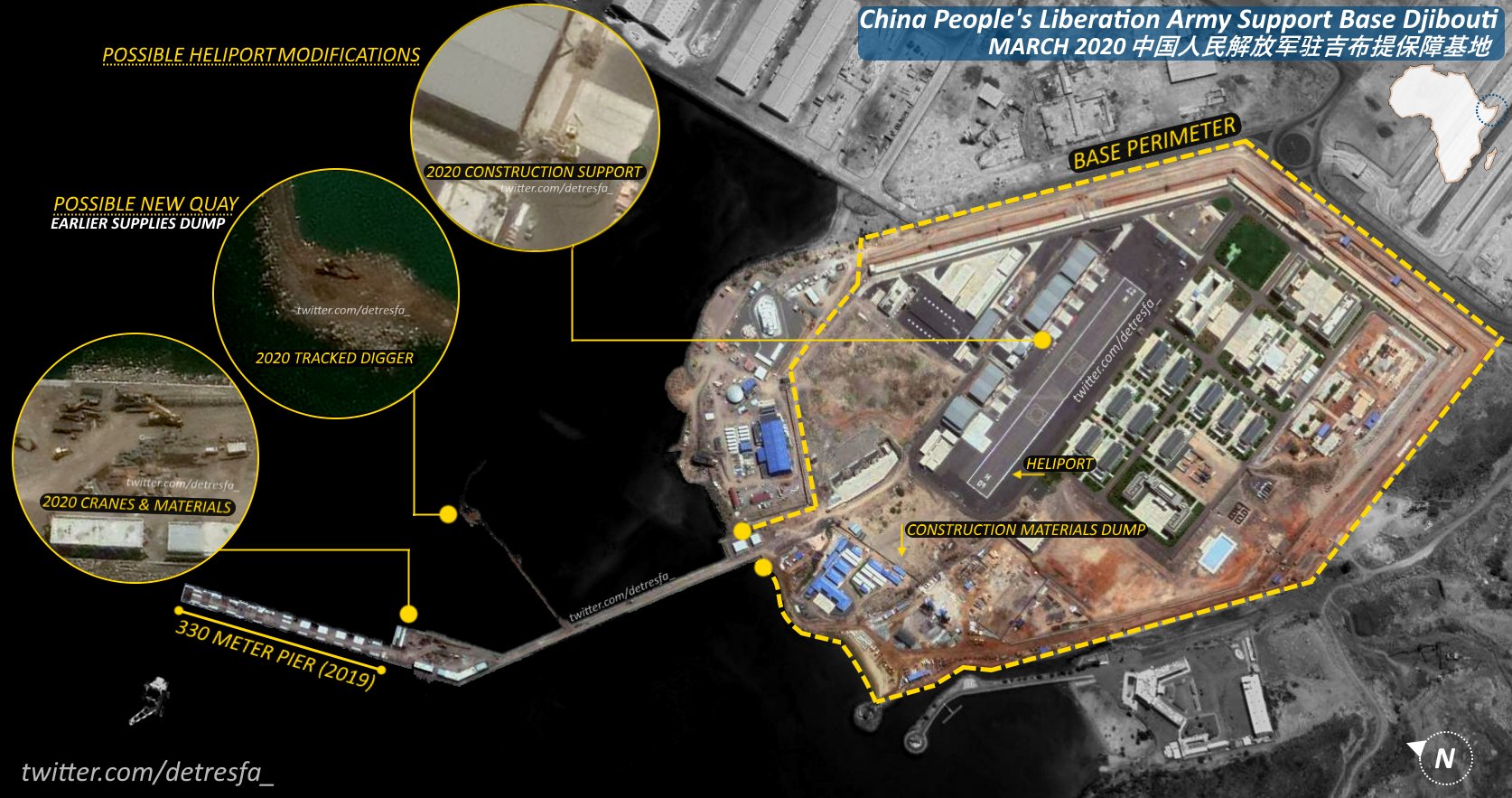- Featured
- No Comment
China pledges military support for Zimbabwe; looks to further boost presence in Africa

In what could open gates for further Chinese military expansion in Africa, a Chinese official has announced that his country is committed to supporting Zimbabwe’s military as the friendship between the People’s Liberation Army (PLA) and Zimbabwe Defense Forces (ZDF) deepens.
Speaking at the People’s Liberation Army (PLA) 96th Anniversary Celebration hosted in Harare, Defense Attaché of the Chinese Embassy senior Colonel Yonglong Zhu said the PLA supported international cooperation and worked towards a better world of peace and shared security.
Colonel Yanglong said, “The traditional friendship between the People’s Liberation Army and Zimbabwe Defense Forces was fostered by the founding fathers of the two countries in the 1960s and has always been cherished and constantly promoted by the two sides over the past decades.”
The colonel stressed the growing bonhomie between the two countries, especially in recent years. He observed in his speech, “The recent years have witnessed this brotherly relationship further strengthened with friendly exchanges and cooperation in all fields flourishing.”
“Especially during the pandemic, the two armies did not interrupt any cooperation and exchanges, have actively overcome the interference of the pandemic, and continue to advance the development of the relationship between the two armies,” he added.
Further, the announcement comes when Zimbabwe has applied to join the BRICS New Development Bank (NDB), of which China is also a part.
As reported by Xinhua, President of Zimbabwe Emmerson Mnangagwa is banking on Russia’s support for its admission into the bank, which was established jointly by Brazil, Russia, India, China, and South Africa.
The development comes in the wake of concerns that the African continent, which has traditionally relied on Russia for military support, braces for a period of uncertainty due to the ongoing Ukraine war. China has the perfect opportunity to push with its military investments, arms sales, and security cooperation agreements.
With historical links dating back to the anti-colonial liberation struggles of the 1950s and 1960s, Russia provides just under half of the military hardware in Africa. Troops are trained, weapons are sold, and mercenaries are sent out as the cornerstones of security assistance.
Although reports published earlier this year suggested that countries in the West African region, including Nigeria and Equatorial Guinea, were among those tilting towards China for military support, Zimbabwe in the southern African region seems to be following suit.
The concerns about China’s expansion in the African region are also exacerbated by the possibility of Beijing acquiring basing rights in the countries by the massive capital they could offer under the Belt and Road Initiative (BRI), besides the security agreements and military sales.

This argument, put forward by Western commentators, is based on China establishing a full-functional military base in the East African country of Djibouti, information about a potential base in the United Arab Emirates last year, and the announcement this spring of Chinese investment in a Cambodian military base with alleged sole Chinese use.
While the scope of the Chinese military support to Zimbabwe is unknown, Colonel Yonglong Zhu said, “A friend in need is a friend indeed. China will forever cherish the traditional friendship with Zimbabwe, and the People’s Liberation Army of China will always be a close friend and trustworthy partner of the Zimbabwe Defense Forces.”
China’s Ties With Zimbabwe Are Blooming
The Chinese army, according to Colonel Yonglong, firmly maintains the goals and tenets of the UN Charter while establishing a new kind of security relationship based on equality, reciprocal trust, and win-win collaboration.
“China actively supports the United Nations peacekeeping operations. It is a major contributor to the UN peacekeeping budget and the largest troop-contributing country among the permanent members of the United Nations Security Council,” he said.
He added, “In line with relevant Security Council resolutions, since December 2008, the Chinese government has dispatched naval ships to carry out vessel protection operations in the Gulf of Aden and the waters off the coast of Somalia. China’s armed forces actively participate in international disaster rescue and humanitarian assistance efforts.”
Going above and beyond this, a study published in the Journal of Global Security Studies last fall stated that Zimbabwe is the top recipient of Chinese military aid. “Zimbabwe is perhaps the most long-standing African recipient of security force assistance (SFA) from China,” two senior researchers at the Peace Research Institute Oslo, Ilaria Carrozza and Nicholas Marsh, said in the study.
During its liberation struggle, the Mugabe-led Zimbabwe African National Union-Patriotic Front received military training from China. President Emmerson Mnangagwa, who took office five years ago after the coup that toppled Mugabe, was among those trained.
“This provision of support helped seal a security relationship between China and the leadership of Zimbabwe which continues to this day,” the study said.
According to Carrozza, security force support includes grants, usually in the form of military training and equipment, to increase a recipient’s security forces’ capacity.
Since the United States and other Western countries imposed sanctions on Harare two decades ago due to human rights violations, Zimbabwe has been cut off from international capital markets. This has left Beijing as the primary financier of infrastructure projects like hydroelectric dams, airports, and roads.
Zimbabwe’s political leadership, however, continues to push back. In May this year, in an interview with the Global Times, Zimbabwean’s Foreign Minister said, “We seek to learn from the Chinese experience, and China is willing to give us an equal footing. However, the American approach is different; they mix it up with ‘human rights’ and think we must be like them. But we cannot like them, and we are not American.”
According to the study, China has helped 47 African nations militarily over the past 20 years, with Zimbabwe and Angola receiving the most military equipment and training. Beijing also supported the Economic Community of West African States Standby Force and the African Union Mission in Somalia (AMISOM).
The same study emphasized that “While SFA provided by China is mainly motivated by economic interests and does not at present seem to challenge the US and its allies, its provision of SFA might have unintended consequences, including an increasing fragmentation of African security forces that receive training from several different providers.”
This alludes to the various accusations against China by its Western rivals about its military expansion across the African continent. Moreover, as cooperation between the two countries grows, especially with Moscow’s involvement in the Ukraine war, the situation seems ripe for Beijing to step in.
